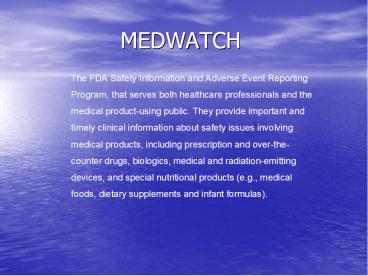MEDWATCH PowerPoint PPT Presentation
1 / 4
Title: MEDWATCH
1
MEDWATCH
The FDA Safety Information and Adverse Event
Reporting Program, that serves both healthcare p
rofessionals and the medical product-using publi
c. They provide important and
timely clinical information about safety issues
involving medical products, including prescripti
on and over-the- counter drugs, biologics, medica
l and radiation-emitting devices, and special nu
tritional products (e.g., medical
foods, dietary supplements and infant formulas).
2
USE OF SKIN PRODUCTS CONTAINING NUMBING
INGREDIENTS (TOPICAL ANESTHETIC DRUGS)FOR
COSMETIC PROCEDURE AND POTENTIAL LIFE-THREATENING
SIDE EFFECTS
- FDA informed consumers
and healthcare professionals of the potential
hazards of using skin numbing products containing
topical anesthetic drugs such as lidocaine,
tetracaine, benzocaine, and prilocaine in a
cream, ointment, or gel. Numbing products are
widely used to numb the skin for medical and
cosmetic procedures, and to relieve pain, burning
and itching due to a variety of medical
conditions. FDA has approved many of these
products uses. Some of these products must be
prescribed by a doctor, others may be purchased
without a prescription. FDA is aware that use of
these products before a cosmetic procedure may
not be supervised by trained health professional.
With out this supervision, a patient may apply
large amounts of the numbing products to their
skin, which can cause life-threatening side
effects and death. If a skin numbing product is
prescribed or recommended for a procedure,
consumers should do the following - Use a topical anesthetic approved by FDA
- Use a topical anesthetic that contains the lowest
amount of anesthetic drugs possible that will
relieved pain. - Ask for instructions from your doctor on how to
safely use the topical anesthetic. - Read the complete
MedWatch 2007 Safety summary, including the link
to the FDAs Public Health Advisory regarding
this issue at -
http//www.fda.gov/medwatch/safety/2007/safety07.h
tmAnesthetics -
Or - Snapshot as on GMT
Wed Feb 7 043620 2007
3
NEW ONLINE TUTORIAL ON DRUG SAFETY AVAILABLE FOR
HEALTHCAREPROFESSIONALS AND THEIR PATIENTSa
letter from FDA Safety Information and Adverse
Event Reporting Program
- Dear FDA MedWatch listserve subscriber
- These FDA MedWatch safety alert
notices are sent at your request to help you
rapidly learn about updated safety information on
the human healthcare products-drugs, both Rx and
OTC, medical devices and diagnostics, biologics,
and dietary supplements that FDA monitors for
safety following their approval and that you and
your patients may use, prescribe or dispense in
day to day care. - We intend that this information
be concise, science-based, unbiased and
clinically useful information that will help both
provider and patient as they consider treatment
choices. To assist both professionals and the
healthcare consuming public to better understand
the challenges of post-marketing drug and device
surveillance and what FDA offers to address that
challenge, I am pleased to announce of a
web-based self-learning tutorial, FDA MedWatch
and Patient Safety, http//www.connective.com - This 30 minute video program
will allow you, as either provider or patient, to
have a better understanding of why voluntary
reporting of serious adverse events, product
quality problems and product use errors is
essential to FDAs safety monitoring process, how
FDA evaluates and takes action on your reports,
and how MedWatch takes that new safety
information and makes it available for your use. - If you have comments about your
FDA MedWatch safety alert process, this Patient
Safety Tutorial or suggestions for how to share
this FDA safety message more widely, please
address your reply to CDERMedWatchTutorial_at_fda.h
hs.gov - Norman S. Marks, MD,MHA
- Medical Director, MedWatch
- FDA/CDER/Office of the Center
- Director
- Safety Policy and Communication Staff
- www.fda.gov/medwatch
4
In September 2006, the Institute 0f Medicine
(IOM) issued a report, The Future of Drug Safety
Promoting and Protecting the Health of the
Public, that included substantive recommendations
on how the FDA can improve its drug safety
efforts. The FDA response, issued on January 30,
2007, details a comprehensive approach to the
IOMs suggestions. It includes 18 actions that
were initiated recently as a result of FDAs own
assessment of the drug safety system, eight items
that are part of the proposed recommendations for
the reauthorization of the Prescription Drug
Users Fee Act PDUFA and 15 new items. To learn
more about the FDA response, please
seeFDAs THE FUTURE OF DRUG SAFETY report
http//www.fda.gov/oc/reports/iom03007.htmlFD
As Commitment to Drug Safety Fact Sheet
http//www.fda.gov/oc/factsheets/drugsafety-.html

